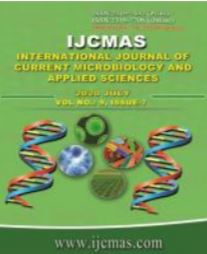


 National Academy of Agricultural Sciences (NAAS)
National Academy of Agricultural Sciences (NAAS)

|
PRINT ISSN : 2319-7692
Online ISSN : 2319-7706 Issues : 12 per year Publisher : Excellent Publishers Email : editorijcmas@gmail.com / submit@ijcmas.com Editor-in-chief: Dr.M.Prakash Index Copernicus ICV 2018: 95.39 NAAS RATING 2020: 5.38 |
The present investigation was carried out with the objectives to estimate genetic variability for yield and yield contributing components. The investigation consisted of twenty rice genotypes and the experiment was conducted during Kharif-2018-19 in Randomized Block Design with three replications. The data were recorded for fourteen quantitative characters to study genetic variability, heritability and genetic advance. Analysis of variance among twenty genotypes showed significant difference for all characters under studied. Highest genotypic coefficient of variation (GCV) and phenotypic coefficient variation (PCV) was observed for grains per panicle followed by panicle bearing tillers per plant and spikelets per panicle in controlled condition, whereas, in saline condition highest genotypic coefficient of variation (GCV) and phenotypic coefficient variation (PCV) was observed for panicle bearing tillers per plant followed by grains per panicle and spikelets per panicle. These characters could be used as selection parameters for crop improvement. High estimates of heritability were observed for K+ followed by plant height, days to 50% flowering, harvest index% and grains per panicle in normal soil condition, whereas, in saline condition highest broad sense heritability was recorded in the case of plant height, spikelets per panicle followed by days to 50% flowering, grains per panicle, K+ and harvest index %. In controlled condition high genetic advance were observed for grains per panicle followed by spikelets per panicle, whereas, in saline condition maximum genetic advances was recorded in grains per panicle followed by panicle bearing tillers per plant. It indicated that the presence of additive gene action. Hence, emphasis should be given to select these quantitative traits to enhance the yield potential of rice (Oryza sativa L.) under both conditions.
 |
 |
 |
 |
 |